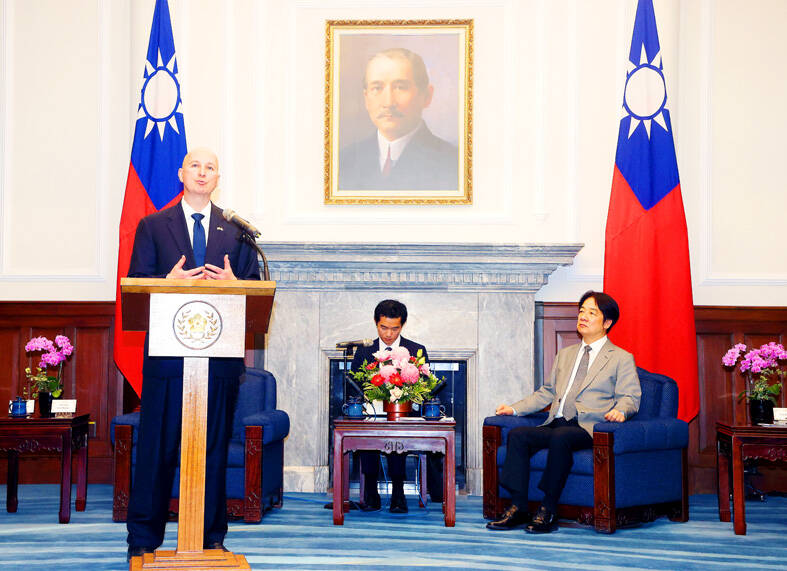The US would continue to assist Taiwan with its self-defense and wants to see peace across the Taiwan Strait without coercion or the threat of force, a visiting US senator told President William Lai (賴清德) yesterday.
Republican Senator Pete Ricketts in a meeting with Lai at the Presidential Office in Taipei said that although administrations change, bipartisan support for Taiwan in the US Congress has continued.
“The United States is committed to peace and stability in the Indo-Pacific. We want to see peace across the Taiwan Strait. We oppose any unilateral change in the status of Taiwan,” Ricketts said.

Photo: CNA
“We expect any differences between Taiwan and the mainland to be resolved peacefully without coercion or the threat of force,” he said. “To that end, the United States will continue to assist Taiwan in its self-defense. There is broad consensus in the US Congress to support Taiwan’s self-defense.”
Lai said that he looked forward to Taiwan and the US continuing to work together to maintain peace and stability in the region, and that Taiwan was committed to spending more on its defense.
A bipartisan group of US lawmakers are on their first trip to Taiwan under the new administration, aiming to show Taipei and Beijing that Washington’s support for Taiwan’s defense remains broad, despite the harsh words and tariffs from US President Donald Trump.
Ricketts is being accompanied by Republican Senator Ted Budd and Democratic Senator Chris Coons.
Many Asia-Pacific nations are eschewing the retaliatory criticism and tariffs of some of the US’ European allies after Trump earlier this month slapped broad tariffs on many countries around the world, including 32 percent for Taiwan.
Despite that hit, conversations in Taiwan this week were “optimistic and forward-looking,” Coons said, adding that he was “optimistic that we’re going to see a strong next chapter in US-Taiwan relations.”
That includes assurances from Taiwanese that they are working fast to strike new trade and investment deals that suit the Trump administration.
Learning from Ukraine’s defense against Russia and criticism from Trump, Taiwan also said it is investing fast to make the military stronger, nimbler and less dependent on the US, as the nation’s strongest deterrent against China, the US lawmakers said.
That includes seeking investment with the US on drone warfare, learning from Ukraine using fleet fighting forces with portable Stingers, the lawmakers said.
The senators made the remarks ahead of talks yesterday with Lai, Minister of National Defense Wellington Koo (顧立雄) and National Security Council Secretary-General Joseph Wu (吳釗燮).
Ricketts said Taiwanese leaders had already reached out to US Secretary of Commerce Howard Lutnick for negotiations, moving quickly in the 90-day pause that Trump announced before the US starts enforcing the new tariffs.
Regarding China, Coons said: “Of course, there is the possibility that [Chinese President] Xi Jinping [習近平] would decide that this is the right time for the Chinese Communist Party to take aggressive action.”
“I think it’s exactly the wrong thing for them to do,” Coons said. “I think they would find a forceful and united response.”

‘ABUSE OF POWER’: Lee Chun-yi allegedly used a Control Yuan vehicle to transport his dog to a pet grooming salon and take his wife to restaurants, media reports said Control Yuan Secretary-General Lee Chun-yi (李俊俋) resigned on Sunday night, admitting that he had misused a government vehicle, as reported by the media. Control Yuan Vice President Lee Hung-chun (李鴻鈞) yesterday apologized to the public over the issue. The watchdog body would follow up on similar accusations made by the Chinese Nationalist Party (KMT) and would investigate the alleged misuse of government vehicles by three other Control Yuan members: Su Li-chiung (蘇麗瓊), Lin Yu-jung (林郁容) and Wang Jung-chang (王榮璋), Lee Hung-chun said. Lee Chun-yi in a statement apologized for using a Control Yuan vehicle to transport his dog to a

Taiwan yesterday denied Chinese allegations that its military was behind a cyberattack on a technology company in Guangzhou, after city authorities issued warrants for 20 suspects. The Guangzhou Municipal Public Security Bureau earlier yesterday issued warrants for 20 people it identified as members of the Information, Communications and Electronic Force Command (ICEFCOM). The bureau alleged they were behind a May 20 cyberattack targeting the backend system of a self-service facility at the company. “ICEFCOM, under Taiwan’s ruling Democratic Progressive Party, directed the illegal attack,” the warrant says. The bureau placed a bounty of 10,000 yuan (US$1,392) on each of the 20 people named in

The High Court yesterday found a New Taipei City woman guilty of charges related to helping Beijing secure surrender agreements from military service members. Lee Huei-hsin (李慧馨) was sentenced to six years and eight months in prison for breaching the National Security Act (國家安全法), making illegal compacts with government employees and bribery, the court said. The verdict is final. Lee, the manager of a temple in the city’s Lujhou District (蘆洲), was accused of arranging for eight service members to make surrender pledges to the Chinese People’s Liberation Army in exchange for money, the court said. The pledges, which required them to provide identification

INDO-PACIFIC REGION: Royal Navy ships exercise the right of freedom of navigation, including in the Taiwan Strait and South China Sea, the UK’s Tony Radakin told a summit Freedom of navigation in the Indo-Pacific region is as important as it is in the English Channel, British Chief of the Defence Staff Admiral Tony Radakin said at a summit in Singapore on Saturday. The remark came as the British Royal Navy’s flagship aircraft carrier, the HMS Prince of Wales, is on an eight-month deployment to the Indo-Pacific region as head of an international carrier strike group. “Upholding the UN Convention on the Law of the Sea, and with it, the principles of the freedom of navigation, in this part of the world matters to us just as it matters in the